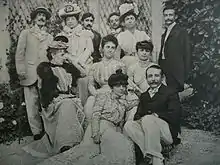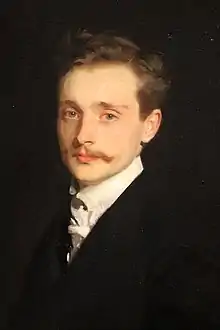Léon Delafosse
Léon Delafosse (1874 – 1951) was a French composer and pianist. His musical works included études, arabesques, waltzes and nocturnes.[1] It has been claimed that he was the model for the character of Charles Morel, a violinist portrayed in Marcel Proust's novel In Search of Lost Time.[2]
Delafosse was also painted as the subject of a portrait by John Singer Sargent.[3] The portrait currently resides in the Seattle Art Museum.[4] Sargent had also dedicated "The Grand Canal Venice" to Delafosse, writing in the inscription "à Léon Delafosse en toute admiration et amitié".[2]
Biography

Delafosse was born poor. His mother was a concierge, who also taught him piano as a child.[5] Delafosse became a student of Antoine François Marmontel (1850-1907) at the Conservatoire de Paris. He gave his first recital at the age of seven, and won first prize at the Conservatoire at age 13.[6] He subsequently became the protégé of the poet Robert de Montesquiou (1855-1921),[7] the countess Metternich and the princess Rachel de Brancovan. He gave recitals, but also wrote compositions for piano, including Soirée d'amour (1895), Quintette des fleurs (1896), Mandolines à la Passante and Cinq Fantaisies, and a Concerto (1898) and a Konzertstück for piano and orchestra.
In 1894 he came into contact with Marcel Proust;[8] they became friends, and he set one of Proust's poems, "Mensonges" (Lies) to music.[2][5] Delafosse dedicated compositions to both Montesquiou and Proust. Montesquiou called him "The lion of the piano".[6] Both writers would later distance themselves from Delafosse, making him no longer welcome in Parisian literary salons. When a friend suggested to Proust to organize a concert with Delafosse, Proust replied that he would rather not see him: "M. Delafosse, qu'il me serait peu agréable d'avoir chez moi".[9]
Performances and compositions
Delafosse was known for his interpretations of Chopin[3] and Liszt.[6] He often performed in the drawing room of Countess Saussine, and gave several private recitals at the Salle Érard in 1893/1894. In 1896 Delafosse gave a series of concerts in London with the famous Belgian violinist Eugène Ysaÿe to a mixed reception.[6][10]
| Date Published | Name | Sections | Dedicated to |
|---|---|---|---|
| 1895 | Les chauves-souris | 8 | Madeleine Lemaire, Madame la Comtesse de Saussine, Madame la Comtesse E. d'Avaray, M. Marcel Proust, M. Maurice Bagès |
| 1896 | Soirs d'amour | 6 | Sybil Sanderson |
| 1897 | Quintette de fleurs | 5 | Madame la Comtesse Potocka |
| 1900 | Fantaisie pour piano et orchestre | 1 | Teresa Carreño |
| 1900 | Nocturne | 1 | la Princesse Bassaraba de Brancovan |
| 1902 | 6 Etudes de concert | 6 | Madame Szarvady, Madame Beddington, Mr. Antonin Marmontel |
| 1910 | Prelude in C minor | 1 | Monsieur Percy Grainger |
| 1910 | Arabesques | 5 | |
| 1910 | Valse | 1 | |
| 1911 | Barcarolle No.2 | 1 | Monsieur F. Held |
| 1912 | Offrandes | 6 | |
| 1937 | Symphonie Pianistique | 5 |
References
- "Compositions by Léon Delafosse". IMSLP. Retrieved 23 May 2020.
- "John Singer Sargent's Portrait of Léon Delafosse". JSS Gallery. Retrieved 23 May 2020.
- Fairbrother, Trevor, John Singer Sargent: The Sensualist, Yale University Press, 2000, ISBN 0300087446, p. 412, note 7
- "Collections". Seattle Art Museum.
- Carter, William C. (2000). Marcel Proust: A Life. New Haven and London: Yale University Press. pp. 155, 274. ISBN 978-0-300-19179-0.
- "Illustrated London News, Saturday 24 October 1896". The British Newspaper Archive. Retrieved 23 May 2020.
- Calza, Renato (2015). L'angelo e il conte: Léon Delafosse e Robert de Montesquiou. Libreria musicale italiana. ISBN 9788870968286.
- Alù, Gabriella. "Friends and acquaintances". The World of Marcel Proust. Retrieved 23 May 2020.
- Nectoux, Jean-Michel (October 2015). Correspondance de Gabriel Fauré. Fayard. p. 412. ISBN 978-2-213-68879-4.
- "The Musical Times and Singing Class Circular". Musical Times Publications. 37 (645): 740. 1 November 1896. JSTOR 3367980.
